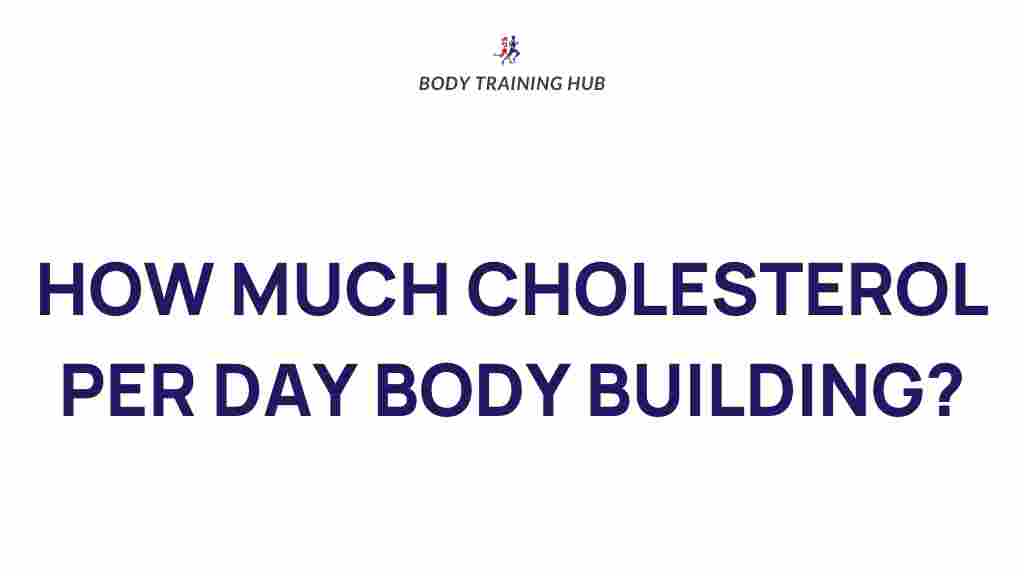Unveiling the Truth: Optimal Cholesterol Intake for Bodybuilding Success
In the world of bodybuilding, nutrition plays a crucial role in achieving muscle growth and overall fitness. One of the most debated topics in nutrition is cholesterol. Many bodybuilders and fitness enthusiasts are often confused about whether cholesterol is beneficial or harmful, leading to various myths and misconceptions. This article aims to clarify the facts about cholesterol intake for bodybuilding success, emphasizing its importance in a well-rounded diet, and how it can affect your health and fitness journey.
Understanding Cholesterol: The Basics
Cholesterol is a waxy substance found in your blood and is essential for the production of hormones, vitamin D, and substances that help you digest foods. There are two main types of cholesterol:
- Low-Density Lipoprotein (LDL): Often referred to as “bad” cholesterol, high levels of LDL can lead to the buildup of plaque in your arteries, increasing the risk of heart disease.
- High-Density Lipoprotein (HDL): Known as “good” cholesterol, HDL helps remove other forms of cholesterol from your bloodstream, reducing the risk of heart disease.
In bodybuilding, maintaining a healthy balance of these two types of cholesterol is crucial for optimal performance and overall health.
The Role of Cholesterol in Bodybuilding
Cholesterol plays several key roles in supporting muscle growth and recovery:
- Hormone Production: Cholesterol is a precursor to hormones like testosterone, which is vital for muscle growth and repair.
- Cell Membrane Integrity: Cholesterol is essential for maintaining the structure of cell membranes, which is crucial for muscle cells.
- Vitamin D Synthesis: Cholesterol is involved in the synthesis of vitamin D, which supports bone health and muscle function.
Understanding these roles can help bodybuilders appreciate the importance of including cholesterol in their diet.
Optimal Cholesterol Intake for Bodybuilders
Determining the optimal cholesterol intake for bodybuilding requires a thoughtful approach. Here are some guidelines:
- Moderation is Key: While cholesterol is necessary, moderation is important. Aim for a cholesterol intake of less than 300 mg per day for most people, but bodybuilders may require slightly more depending on their dietary needs.
- Focus on Healthy Sources: Incorporate foods that provide healthy cholesterol options, such as:
- Eggs
- Lean meats
- Fish
- Dairy products
- Balance with Healthy Fats: Include sources of omega-3 fatty acids like salmon, walnuts, and flaxseeds, which help improve heart health and may balance cholesterol levels.
Common Myths About Cholesterol and Bodybuilding
There are numerous myths surrounding cholesterol, especially in the context of bodybuilding. Here are a few key misconceptions:
- Myth 1: All Cholesterol is Bad: This is false. While high levels of LDL can be harmful, HDL is beneficial and necessary for good health.
- Myth 2: Eating Cholesterol Raises Blood Cholesterol: Dietary cholesterol has less impact on blood cholesterol levels than previously thought. The body regulates its cholesterol production based on dietary intake.
- Myth 3: Bodybuilders Should Avoid Cholesterol: As discussed, cholesterol is vital for hormone production and muscle growth, making it an important part of a bodybuilder’s diet.
Creating a Nutrition Plan for Bodybuilding Success
To optimize cholesterol intake for bodybuilding success, consider these steps:
1. Assess Your Current Diet
Start by tracking your current food intake to understand your cholesterol levels. Use apps or journals to log your meals.
2. Set Nutritional Goals
Based on your assessment, set goals for your cholesterol intake. Aim for a balanced diet that includes healthy fats and cholesterol sources.
3. Incorporate Cholesterol-Rich Foods
Add foods high in healthy cholesterol to your meals. Incorporate eggs, lean meats, and dairy products into your diet.
4. Monitor Your Progress
Regularly check your cholesterol levels through blood tests. Adjust your diet based on your health and fitness goals.
5. Consult a Nutritionist
If you’re unsure about your cholesterol intake or dietary needs, consider consulting a nutritionist who specializes in bodybuilding.
Exercise and Its Impact on Cholesterol Levels
Regular exercise is a powerful tool for managing cholesterol levels. Here are some exercise tips for bodybuilders:
- Engage in Aerobic Exercise: Activities like running, cycling, or swimming can help raise HDL levels and lower LDL levels.
- Incorporate Strength Training: Lifting weights not only promotes muscle growth but also contributes to a healthier cholesterol balance.
- Stay Active Throughout the Day: Incorporate more physical activity into your daily routine to support overall health.
Troubleshooting Tips for Cholesterol Management
If you’re struggling to manage your cholesterol levels while bodybuilding, consider these troubleshooting tips:
- Review Your Diet: Make sure you’re including enough healthy fats and cholesterol sources in your meals.
- Adjust Your Exercise Routine: If you’re not seeing improvements, consider varying your exercise regimen to include more aerobic activities.
- Monitor Stress Levels: High stress can negatively impact cholesterol levels. Practice stress-reducing techniques like meditation or yoga.
- Stay Hydrated: Proper hydration supports overall health and can aid in maintaining healthy cholesterol levels.
Conclusion
Understanding the optimal cholesterol intake for bodybuilding is essential for achieving fitness goals. By debunking myths and recognizing the importance of cholesterol in muscle growth and recovery, bodybuilders can make informed dietary choices. Remember that moderation, healthy sources, and a balanced diet are key to success. Coupled with regular exercise, you can effectively manage your cholesterol levels and enhance your overall health and fitness.
For more information on nutrition and bodybuilding, visit our nutrition resources. For external research on cholesterol and health, check out the CDC Cholesterol Fact Sheet.
By being proactive about your cholesterol intake and embracing a holistic approach to nutrition and exercise, you’ll be well on your way to achieving bodybuilding success.
This article is in the category Nutrition Fundamentals and created by BodyTraining Team
